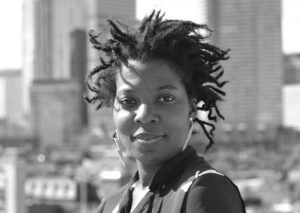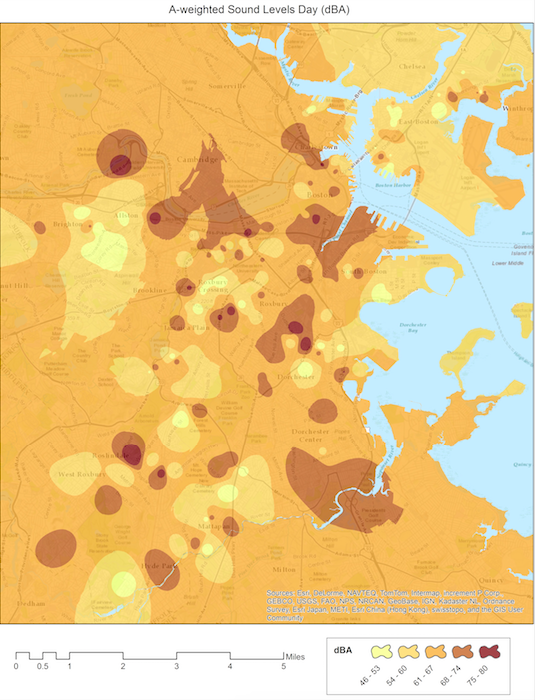 Erica Walker (MSc ’11) is the founder of Noise and the City, an organization with a mission of providing community residents with accessible and relevant noise advocacy tools. She recently released NoiseScore, a free smartphone application that allows community members to objectively and subjectively describe community noise issues and map their response in real-time. She graduated from the UEP program in 2011 with a Master of Science degree in Environmental Economics and Urban Planning, and recently graduated from the Harvard T.H. Chan School of Public Health with a doctorate in Environmental Health. She feels a bit hypocritical because she loves the idea of urban chickens despite knowing how loud they can be. Current UEP student Liza Burkin interviewed her via email:
Erica Walker (MSc ’11) is the founder of Noise and the City, an organization with a mission of providing community residents with accessible and relevant noise advocacy tools. She recently released NoiseScore, a free smartphone application that allows community members to objectively and subjectively describe community noise issues and map their response in real-time. She graduated from the UEP program in 2011 with a Master of Science degree in Environmental Economics and Urban Planning, and recently graduated from the Harvard T.H. Chan School of Public Health with a doctorate in Environmental Health. She feels a bit hypocritical because she loves the idea of urban chickens despite knowing how loud they can be. Current UEP student Liza Burkin interviewed her via email:
Liza Burkin: Your bio explains how a noisy living situation and the resulting interactions with landlords, police, and city officials led to your interest in understanding community noise. Many planners and policymakers take personal issues/passions and pursue change on the professional level, while others work on issues that don’t affect them personally. How has that experience influenced your work?
Erica Walker: The experience put me on a path that I had never really considered. My original strategy was to gather enough evidence to show that the noise levels emanating from my neighbors above me were in breach of the covenant of quiet enjoyment and sue. I started an excel spread sheet and began to document everything – times, dates, actions, reactions. I purchased a cheap sound level meter and began to log the decibel level and also borrowed an audio recorder from a friend to record the actual noise. In doing this, the questions began to flow: What is quiet enjoyment? How is it enforced? How effective is dealing with noise issues in a court of law? What is sound? What is noise? What is a decibel? What is an A-weighted decibel? Who else is dealing with this crap? Who cares, besides me?
The answers to these questions created even more questions and I became transfixed by this bigger picture. Apparently, even though I was studying environmental economics and urban planning, I needed to consider these things I had never heard of like public health and acoustics. So, I moved out of my apartment and away from those noisy neighbors (something I vowed I would NEVER do). I may have lost that battle but I sure as hell was going to win the war.
I personally believe that when you try to solve a problem from a place of passion, the desire to win the war becomes a matter of life and death. I suppose I am being a bit dramatic, but what I mean to say is that there is no task too demanding, no idea too irrational, and no path too unconquerable to quell that burning desire to find the solution. You are open – raw. You are emotional. Everything touches you because you care so much. You don’t give up, ever, because you have decided that this is everything you believe in. You roll with the punches. You accept wins with humility and swallow setbacks with grace. You are on this journey — you are living, breathing, and feeling every bit of it — but you realize that this journey is not about you and, in many ways, it never really was. It is and always has been about the solution. So, you have to check your ego at the door and be comfortable with: your ideas being challenged, ridiculed, and ignored; the uncertainty of the entire process, and not being afraid of the shape and form of the authenticity that emerges after all has been said and done.
LB: Do you often run up against institutions or individual actors who sweep noise aside as a personal problem? If yes, what are your key methods of combating those assertions and making your case?
EW: It is neither individuals nor institutions. It is our society at large. For some reason, we believe that noise is this artifact, this sacrifice of/due to modernization. Noise, we think, is a mere nuisance, and not a significant environmental stressor negatively impacting our health. As an exposure scientist, I am here to document evidence by gathering data. As an epidemiologist, I make associations by analyzing the data, as a citizen invested in my community, I report my findings in a way that that is useful and compelling and accessible. Everything I do is documented on my website and is freely available to the community to download/listen to/view/interact with. This is of utmost importance to me.
LB: How did your experience at Tufts prepare you for this work? Anything you got out of UEP that has helped with measuring the intersections of community noise and public health?
EW: Tufts welcomed and accepted me for who I was — every ounce of my curious, crazy, and determined self. They let me color outside of the lines, and to this day, I appreciate that even though I may have taken it for granted at the time. The UEP program gave me a space to explore the depth of my thoughts, to ask even more questions, and to try. This gave me confidence. I met my close friend, Julio Cesar Roman (MPP 2012) who has been instrumental in helping me to realize my ideas. We work together till this day. Doug Brugge (PI of The Community Assessment of Freeway Exposure and Health (CAFEH) study at the Tufts University School of Medicine) gave me a bit of real estate within his study to model noise exposure, which served as the launching pad for my life as a noise researcher. And, most importantly, my advisor (Mary Davis) said to me, “I think what you really want to do is this thing called Public Health.”

From February 2015 – February 2016, Walker measured the ambient sound levels at over 400 sites within the City of Boston.
LB: What are some “low-hanging fruit” methods that communities can take to lower their noise levels?
EW: We can be more aware and more considerate of the space we share with others. We can lower the volume, across the board. We can also listen. In my experiences, people tend to be louder when they feel they are not being heard. Respect for others goes a long way and I feel sort of guilty about placing it in the “low-hanging fruit” category.
LB: What are the harder ones?
EW: Deeply questioning the way things are currently done around community noise issues and becoming comfortable with the uncomfortableness that comes with realizing that things will need change. Attitudes need to change. More resources need to be devoted to understanding how and to what extent noise has on the community. We need to shock the status quo. Experimentation – planting more trees, zoning for quiet spaces, encouraging less dependency on motorized vehicles, redesigning noise ordinances, penalizing, outlawing. Some interventions sound sort of nanny state/big brother-ish and some sound a bit crazy, but think about it — 30 years ago we did not separate our garbage into bins of paper, plastic and glass and we did not think twice about lighting up a cigarette indoors. Today, we do. It is second nature and, in the case of smoking, heavily regulated. Not in vain, however. Society has improved because of it. I think the same can be achieved with noise.
LB: Where can Bostonians go to escape the noise? What are some of your favorite urban places?
EW: Smack dab in the heart of the Longwood Medical Area is the Kevin W. Fitzgerald Park. It’s on a hill and has some of the most amazing views of the city. I go there to read, reflect, and meditate. Too numerous to mention individually, but Boston has these small parks throughout the more the residential areas of the city. I spent a year monitoring noise in Boston and would absolutely love to discover these parks! If I found one, after I completed noise monitoring for the day, I would loop back around and sit for a spell. These parks are so quiet and so peaceful. You could hear the wildlife buzzing and chirping about. You can even hear your heart beat. The next best thing to having a loved one greet you at the door with fluffy slippers, a stiff drink, and a warm bath. Besides these tiny parks, I like being in elevators alone, libraries, and anywhere near water.
